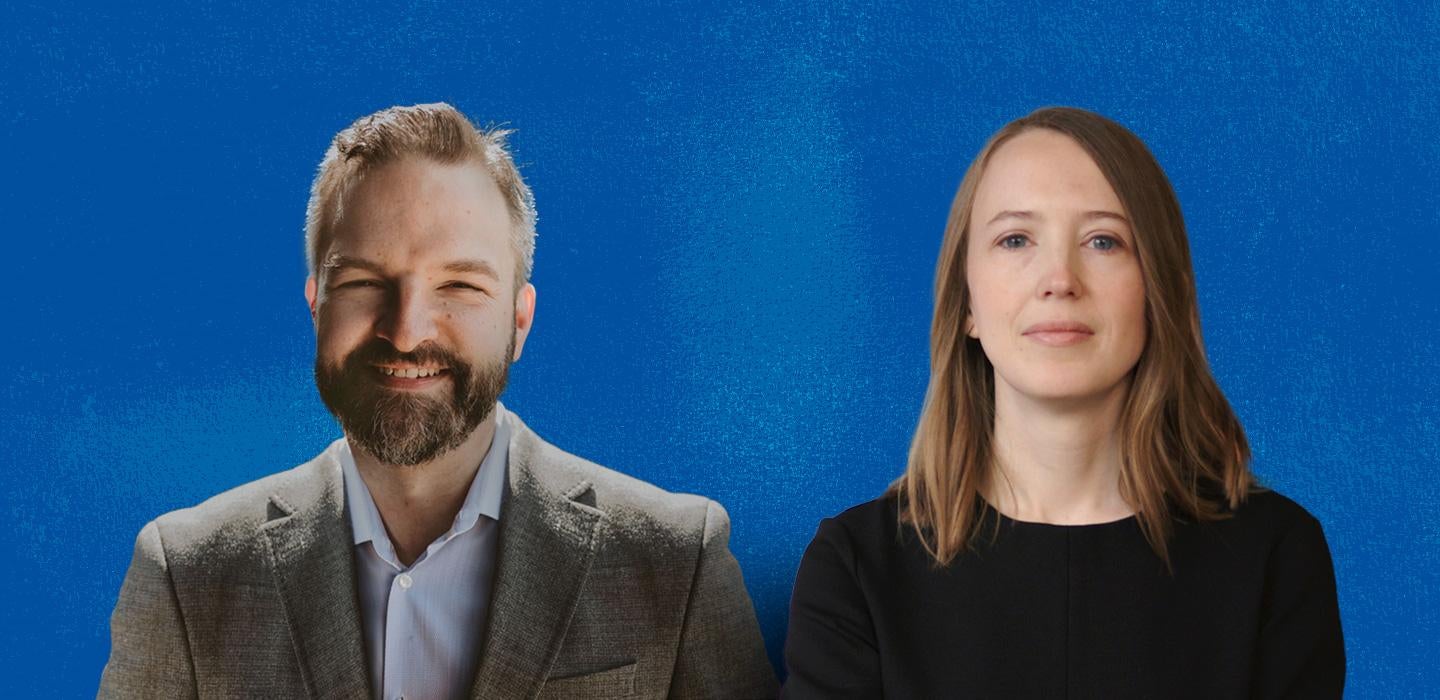
Subscribe to Pittwire Today
Get the most interesting and important stories from the University of Pittsburgh.University of Pittsburgh Assistant Professor of Ophthalmology Leah Byrne and Associate Professor of Immunology Greg M. Delgoffe have been elected as Senior Members of the National Academy of Inventors (NAI). The two awardees are pioneers in the research and commercialization of cell and gene therapies to restore vision and treat cancer, respectively.
“Drs. Byrne and Delgoffe exemplify the ingenuity and the determination of Pitt innovators who are pushing the boundaries of science and are relentless in translating their discoveries into new clinical interventions with the potential to make a difference in people’s lives,” said Evan Facher, Pitt’s vice chancellor for innovation and entrepreneurship and associate dean for commercial translation at the School of Medicine.
NAI Senior Members are active faculty, scientists and administrators from NAI member institutions who have demonstrated remarkable innovation producing technologies that have brought, or aspire to bring, real benefits to the welfare of society. They also have growing success in patents, licensing and commercialization, while educating and mentoring the next generation of inventors.
This year’s class of NAI Senior Members hails from 60 NAI member institutions across the nation. Collectively, they are named inventors on more than 1,000 U.S. patents, with 344 of those being licensed technologies. Women and inventors from underrepresented groups make up more than 50% of the year’s class.
Byrne’s lab is doing groundbreaking work in gene therapy for rare inherited retinal degenerative diseases that result in blindness. Her lab develops viruses with new abilities and improved capabilities to deliver therapeutic genes to the retina that allow for more precise gene delivery and protein expression. The lab also creates gene therapies, including genome editing approaches used to directly rewrite the genome, and optogenetics, which uses light-sensitive proteins to restore vision by creating artificial versions of the photoreceptors that respond to light in the eye.
[Read more: Byrne is also leveling up Pittsburgh’s gene therapy workforce]
Working under the tutelage of the world-renowned José-Alain Sahel, distinguished professor of the Department of Ophthalmology at the School of Medicine and recently elected Fellow of the National Academy of Inventors, Byrne has been prolific in her development of new intellectual property. Already, in a career spanning just over a decade, she has been issued 12 patents for her work with many more in the works. New invention disclosures flow from her lab to the Innovation Institute, a division of the Office of Innovation and Entrepreneurship, regularly throughout the year.
Byrne also serves as chief scientific officer of Avista Therapeutics, which she co-founded along with Sahel and Paul Sieving of UC Davis, the former director of the National Eye Institute. July 2022, the Swiss pharmaceutical company Roche AG partnered with Avista to accelerate the clinical development of gene therapies for retinal diseases. If clinical milestones are met, the deal could end up valued at more than $1 billion, making a significant impact on the Pittsburgh economy and the continued progress of the region’s burgeoning life science ecosystem.
Byrne has received several prestigious awards in her young career: Named an Emerging Vision Scientist from the National Alliance for Eye and Vision Research, she has also earned a Research to Prevent Blindness Career Development Award and a Foundation Fighting Blindness Individual Investigator Award. Earlier in 2023, she was selected for the Emerging Innovator Award from Pitt’s Office of Innovation and Entrepreneurship.
Since arriving at Pitt in 2014, Delgoffe has risen rapidly to a tenured position in Pitt’s renowned Department of Immunology and directs his own lab. In 2022, he was appointed as director of the Tumor Microenvironment Center at the UPMC Hillman Cancer Center.
Delgoffe’s lab studies the intersection of metabolism and immunity in cancer. Specifically, they examine how tumor cells drain their local environment of nutrients, starving tumor-infiltrating T cells and preventing their function. His research leverages both repurposed metabolic drugs and novel synthetic biology approaches to tip this metabolic balance in favor of the tumor-killing immune response.
Delgoffe has been recognized as one of four Pitt health sciences faculty to receive the inaugural Ascending Stars Award, which honors highly productive and creative midcareer faculty members. He has been granted the NIH Director’s New Innovator Award, a Stand Up to Cancer Innovative Research Grant and the Cancer Research Institute’s Lloyd J. Old STAR award, along with being recognized in 2019 as an AACR NextGen Star.
As an assistant professor, Delgoffe co-founded a startup company, Novasenta, with his postdoctoral mentor Dario A.A. Vignali, chair and distinguished professor of the Department of Immunology, and Robert Ferris, director of the UPMC Hillman Cancer Center. Novasenta has raised $60 million since its founding in 2018 and is working toward moving at least one of its therapeutic programs into the clinic in 2024.
It is rare for someone of Delgoffe’s relative youth to be an integral founding member of not just one but two startups that raise significant capital — but in 2022, he co-founded Remplir Bio, which has raised a $7 million seed round as it continues its preclinical work on its immunotherapy platform, which translates immunometabolism into novel cancer therapeutics. In addition to founding companies, he has also licensed much of the technology he has generated in his laboratory, especially viral-based therapies for cancer. One of those technologies is entering the clinic in partnership with Kalivir Immunotherapeutics and Astellas Pharma.
“This year’s class of Senior Members is truly a testament to the outstanding innovation happening at NAI member institutions and what happens when the academic space encourages and celebrates invention and commercialization,” said Paul R. Sanberg, president of NAI.
— Mike Yeomans


